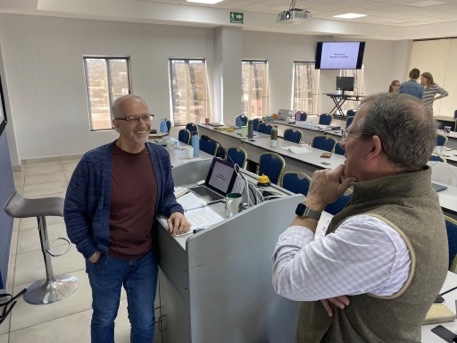Jul 7
2023
Pastoral Intern Update
The kindness of God has been made manifest in so many ways these last two years. We’ve come back to West Michigan, for a brief time, to be of service to the saints at Harvest.
After three years of work at Harvest, I’m grateful to see the way that the Lord has been growing a passion for witness and missions at our church. Here are some upcoming events we ask you to be in prayer for as we prepare for a beautiful summer!
Keep Reading
At a large church, it’s easy to be lost in the crowds and not quite know where your friend group is or what service opportunities there might be. If you would like to share your talents and support our church before VBS this summer, you can fill out the deacons questionnaire share this week
Keep Reading
How important is it that we work in a “Christian” environment? I want to argue that it’s less important than many of us make it out to be and I want to challenge you—if you’re working in a difficult workplace—that perhaps this is where God wants you to continue to labor.
Keep Reading
The key is for us to appreciate our different backgrounds and preferences and joyfully sing the songs we don’t know as well or enjoy as much – in the comforting knowledge that others in the body are greatly blessed by it. The Lord not only delights in robust singing – but in the sincere love we express for one another as we sing.
Keep Reading
For the Pastor’s Post this week I would like to give you all a brief update on my life. I’ve been gone for two weeks – but it feels longer than that and I am happy for the opportunity to reconnect!
Keep Reading
Every single thing that happened this year - in our personal life, in the church of Christ, or in the world around - happened “according to the purpose of Him who works all things according to the counsel of His will” (Eph 1:11).
Keep Reading
The Christmas program this past Sunday evening was a delightful reminder to me of the goodness of God revealed in the wonder of children. I
Keep Reading
These past few days have been very rewarding. I’m in southern California for Home Missions Board meetings and I’ve told several people that this has been the most enjoyable Home Missions meeting I’ve ever attended (and I’ve been on the Board for 16 years).
Keep Reading
Following in the pattern of Paul and John, I have to say “thank you” to God for the grace that I see at work in the lives of Harvest members.
Keep ReadingJul 7
2023
The kindness of God has been made manifest in so many ways these last two years. We’ve come back to West Michigan, for a brief time, to be of service to the saints at Harvest.
Jun 30
2023
Many people experience PVB because they hate their job or their ‘normal’ life. That’s not the case for me at all. I love my work and I feel incredibly blessed in my normal life. It’s just not home – not in that deep sense. Normal life, in this present evil age with a not-yet-perfected self, is a life filled with stress, conflict, loss, fear, weariness, anxiety, etc. Normal work is filled with thorns and thistles – and something deep within me longs for beauty and for deep body and soul rest. That’s why I cry a little when I must leave the place where I experience a taste of it. It feels like leaving what I was made for.
Jun 22
2023
Scripture memory, however, whether it be for adults or kids, is not something we do just for kicks or to gain some religious points. Scripture memory is about worship, holiness, ministry, and mission. L
Jun 9
2023
The month of June is upon us and, with it, the celebration of America’s true public religion – Pride. Our nation, with much of the western world, has committed itself wholesale to the worship of unlimited sexual license and the aggressive evangelizing of the LGTBQ+ agenda. This is not about politics, or social policy, or human rights. At its core, this is purely about worship. It is demonically driven rebellion against the Living God and His good creation. This is man “exchanging the truth of God for a lie” and God, in judicial response, giving our society “over to a debased mind to do what ought not to be done” (Romans 1:28). Pride Month is man shaking his fist in the face of God – and God revealing His just and awful response to that wicked pride.
Jun 2
2023
This coming week we welcome Eddie Mercado as Harvest’s full-time, summer pastoral intern. Eddie and his wife Hilary have 4 children: Calvin (9), Ezekiel (7), David (5) and Amelia (3). He was raised in a Christian home in the greater Chicago area, but did not become convicted of his sin and trust in Christ until he was 12-13 years old. In 2016, he and his family began attending Harvest’s evening service while Eddie studied at Kuiper College. The Mercados officially joined Harvest as members in 2020.
May 26
2023
We are people who worry. We worry about our health, about the kids, about our job, about our relationships, the economy, the country, the world. I, for one, am an expert worrier. I can find something to worry about in just about any situation, no matter how good it might be.
May 18
2023
Spring is nearly too much for me. The sheer thrill of warm sunshine, the wonder of growing things, the glory of flowering trees and the smell of warm earth; I can barely contain myself. I feel like a 5-year-old boy on my birthday about to open the presents with cake and ice cream waiting. It’s too good and too much, an overload of the joy-capacitor. The weight of the glory strains what this mortal can handle. I can’t help but think that this experience is a small foretaste of the first day in heaven.
May 5
2023
Why are we taking on this new task of offering English as a Second Language classes? The purpose of ESL ministry is to share the Good News of Christ in word and deed. In Matthew 25, Jesus describes some of the characteristics of his people. These good deeds are not the basis of their salvation, but the evidence or demonstration of it: “The King will say to those on his right, ‘Come, you who are blessed by my Father, inherit the kingdom prepared for you from the foundation of the world. For I was hungry and you gave me food, I was thirsty and you gave me drink, I was a stranger and you welcomed me…”
Apr 28
2023
Have you noticed how the Apostle Paul repeatedly references multiple associates—“fellow workers” and “ministers”—with whom he serves. As Colin Marshall and Tony Payne observe, “Up to 100 names are associated with Paul in the New Testament, of which around 36 could be considered close partners and fellow laborers.” [2] For example, there are Prisca and Aquila (Rom 16:3), Apollos (1 Cor 3:5), Tychichus (Eph 6:21), Epaphroditus (Phil 2:25), Epaphras (Col 1:7), and Timothy (1 Thess 3:2), to name just a few. In a word, Paul carried out his ministry within the context of a team.
Apr 21
2023
I’m convicted by how easily contemporary Christians (me included) act like these fruits are nice-but-not-necessary features of the Christian life. We can all recite them, but how many of us intentionally pursue them? How many of us are deeply conscience stricken when they are not evident in our life? I know some of us are, and I’m deeply thankful for you. But, I feel like my vision of piety has been heavy in how-to-respond-to-God and insufficiently focused on the fruit of the Spirit – which is heavy in how we respond to people.